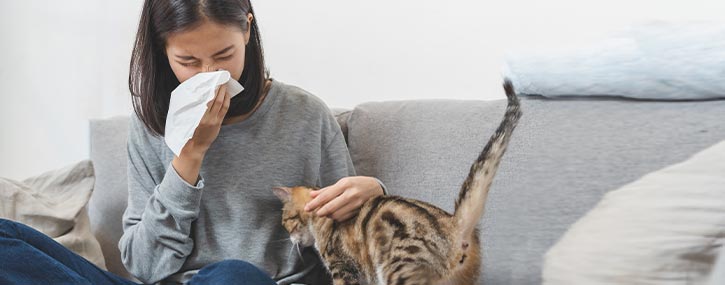Tips for Pet Lovers to Manage Asthma and Allergy Symptom
Understanding your pet allergies can help you understand ways to help you manage your symptoms and make living with your pet easier and help preserve the bond between you and your pet. Come to The Allergy & Asthma Center to talk to our professionals. For more information, contact us or book an online appointment. We have convenient locations to serve you in Lawrenceville GA, Atlanta GA and Conyers, GA.


Table of Contents:
Can people with asthma live with pets?
How can I adjust to pet allergies?
Can you build up immunity to pet allergies?
Allergic asthma and traditional asthma have the same symptoms occur, like severe flair-ups of your asthma symptoms including tightening of the airways, which will make it difficult to breathe, wheezing, coughing, and chest pressure. While the symptoms are similar, it is what causes allergic asthma which is there it differs from traditional asthma. When you experience severe asthma symptoms with allergic asthma, it is due to breathing in an allergen which makes it different.
Allergies are quite common to be diagnosed with, they can affect everything from the way you breathe, to what you eat, animals in the house and even the products you use. When you have an allergy diagnosis combined with an asthma condition, it is known as allergic asthma. This particular type of asthma is a condition where the airways will tighten whenever you breathe in an allergen. Often, it is due to something in the air, like mold spores, pollen, and dander. Allergens are also known as triggers, as they often will set off your asthma. The many things that can cause something with allergic asthma to have a reaction, may not affect others in the same way.
Living with asthma and pets is a possible thing to do, things like having someone else bathe the pet twice a week, removing carpeting to help control dander and fur which will trigger an attack.
Creating no pet zones like bedrooms or rooms with carpet, keeping them contained to only rooms with hardwood. Keeping them off furniture that can trap fur and dander like sofas. Cleaning your home frequently and using a vacuum equipped with a HEPA-rated filter. Protecting your mattress with allergen-proof covers. Use a HEPA cleaner in your bathrooms. To help protect and minimize your asthma attacks you can take your controller medication as prescribed. Always carry your reliever medication especially if you are cuddling and it could trigger an attack. Follow your asthma action plan.
Generally, peoples’ symptoms worsen the more they are exposed but to coexist with your pet you will want to follow a few tips such as, bathe your pets once or twice a week and limit their exposure to a certain area in the house especially ones with carpet or bedrooms. Wash your hands after petting your pet, wash bedding, and toys at a high temperature, and vacuum regularly. These tips can help you adjust or live with your pet while suffering from allergies.
Having a pet may mean you will need to adjust to the allergies they may cause you, but what if you could become desensitized to it? Could immunotherapy work to relieve your allergy symptoms the goal is to have your immune system become less sensitive to the allergens by “getting used to it” where your body is trained to react differently to the allergen, in a sense being vaccinated against yourself. The person would be given a small amount of allergen repeatedly to allow their bodies to get used to it increasing the dose until the maximum is reached.
If you have allergic asthma or allergies to animals, and you are looking for more tips and tricks to allow you to enjoy being around the animals you love, contact us today. We may be able to provide more tips or services to help you continue enjoying your time with your furry loved ones. We serve patients from Lawrenceville GA, Atlanta GA, Conyers, GA, Suwanee GA, Duluth GA, Grayson GA, Decatur GA, Brookhaven GA, Lithonia GA, and Covington GA.

Additional Allergy & Asthma Services
▸ Allergy Shots
▸ Allergy Testing
▸ Asthma
▸ Bronchodilators
▸ Drug Allergy
▸ Food Allergy
▸ Insect Allergy
▸ Nasal/Sinus Allergies
▸ Pediatric Allergy
▸ Pediatric Asthma
▸ Skin Allergy
▸ Spring Allergies




